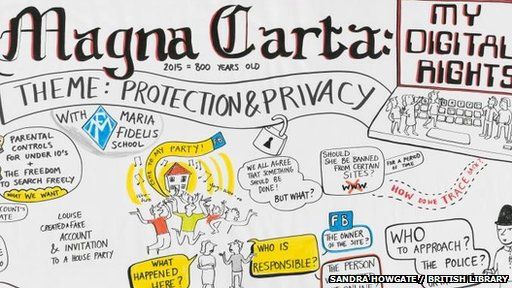Internet 'Magna Carta' vote launched by British Library
- Published

Thousands of young people have taken part in a UK debate about what should be included in a "Magna Carta" for the digital age.
Their most popular priority was safety on the net, followed by protecting freedom of speech and privacy.
The public can now vote online for the clauses they suggested, in a project organised by the British Library.
The vote marks the 800th anniversary of the Magna Carta and the 25th birthday of the world wide web.
The top 10 most popular clauses will be revealed on Monday 15 June.
The Magna Carta was granted by King John of England on 15 June 1215, establishing that the king was subject to the law rather than being above it.
According to analysts ComRes, 29% of people aged 10-18 opted specifically for safety while 17% chose freedom of speech as a clause they wanted to support.
"Nearly half of the clauses talked about students wanting to feel safe and protected online," project manager Sarah Shaw told the BBC.
"We thought there would be more talk about freedom online, and not so much talk on more of a conservative manner."
She said the 3,000 young people who took part in the workshops viewed the internet and the real world in a similar way.
"Several clauses talked about wanting cyber-police," she said.
At time of writing the most popular clause is for the web to be "a digital utopia; the perfect digital world where enjoyment and fulfilment will be accessible from the reach of our fingertips".
Seven of the existing top 10 clauses mention freedom.
Sir Tim Berners-Lee, the inventor of the world wide web, has voiced his support for the project.
"It's important for young people to think about the future now, when we are deciding what sort of a future it will be.
"It's going to be a future they will have to live in," he said.
- Published2 June 2015
- Published13 May 2015